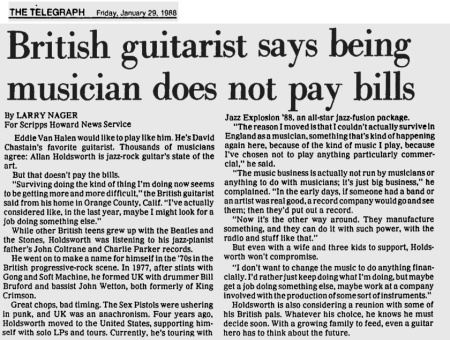British guitarist says being musician does not pay bills (Telegraph 1988)
THE TELEGRAPH
Friday, January 29, 1988 British guitarist says being musician does not pay bills.
By LARRY NAGER For Scripps Howard News Service
Eddie Van Halen would like to play like him. He's David Chastain's favorite guitarist. Thousands of musicians agree: Allan Holdsworth is jazz-rock guitar's state of the art. But that doesn't pay the bills.
"Surviving doing the kind of thing I'm doing now seems to be getting more and more difficult," the British guitarist said from his home in Orange County, Calls. "I've actually considered like, in the last year, maybe I might look for a job doing something else."
While other British teens grew up with the Beatles and the Stones, Holdsworth was listening to his jazz-pianist father's John Coltrane and Charlie Parker records. He went on to make a name for himself in the '70s in the British progressive-rock scene. In 1977, after stints with Gong and Soft Machine, he formed UK with drummer Bill Bruford and bassist John Wetton, both formerly of King Crimson.
Great chops, bad timing.
The Sex Pistols were ushering in punk, and UK was an anachronism. Four years ago, Holdsworth moved to the United States, supporting him. self with solo LPs and tours. Currently, he's touring with Jazz Explosion '88, an all-star jazz-fusion package.
"The reason I moved is that I couldn't actually survive in England as a musician, something that's kind of happening again here, because of the kind of music I play, because I've chosen not to play anything particularly commercial," he said.
"The music business is actually not run by musicians or anything to do with musicians; It's just big business," he complained. "In the early days, if someone had a band or an artist was real good, a record company would go and see them; then they'd put out a record.
"Now It's the other way around. They manufacture something, and they can do it with such power, with the radio and stuff like that."
But even with a wife and three kids to support, Holdsworth won't compromise. "I don't want to change the music to do anything financially. I'd rather just keep doing what I'm doing, but maybe get a job doing something else, maybe work at a company Involved with the production of some sort of instruments."
Holdsworth is also considering a reunion with some of his British pals. Whatever his choice, he knows he must decide soon. With a growing family to feed, even a guitar hero has to think about the future.
